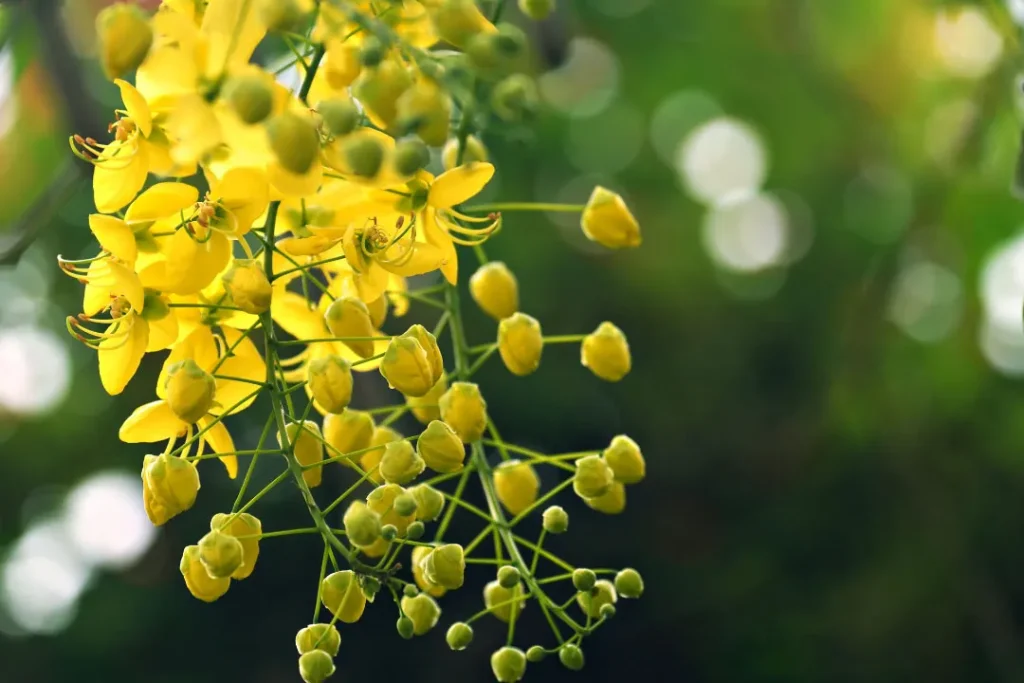The plant Cassia auriculata, often called “Tanner’s Cassia” or “Avaram Senna,” is indigenous to Asia, namely India. Due to its many health advantages, it has a long history of traditional usage in Ayurvedic medicine. This page tries to give a thorough analysis of Cassia auriculata, including its properties, potential health advantages, recommended dose, possible adverse effects, drug interactions, and useful advice.
You May Also Like:
Should You Try CBD for Focus? Here Are the Facts.
The 5 Types of Brain Waves and How You Can Use Them to Maximize Performance
The Nature of Cassia Auriculata
The Fabaceae family includes the shrub or small tree Cassia auriculata. It has elongated pods with tiny seeds within and yellow blooms. The Cassia auriculata plant has an abundance of bioactive substances in its leaves, flowers, and stems, such as flavonoids, phenols, tannins, saponins, and anthraquinones.

Health Benefits of Cassia Auriculata
Due to a variety of bioactive chemicals found in the plant, Cassia auriculata is renowned for its possible health advantages. The following are a few of the main health advantages of Cassia auriculata:
- Effects on Diabetes: Cassia auriculata has long been used to treat diabetes. It may reduce blood sugar levels by boosting insulin production, improving insulin sensitivity, and preventing gastrointestinal absorption of glucose, according to research.
- Liver Protective Properties: Cassia auriculata has hepatoprotective properties that guard the liver against oxidative stress and toxin-induced damage. Additionally, it could promote liver regeneration and enhance liver performance.
- Anti-inflammatory and antioxidant activities: Cassia auriculata includes substances that have strong anti-inflammatory and antioxidant effects. These substances help fight oxidative stress, lessen inflammation, and guard against chronic illnesses.
- Diuretic and detoxifying effects: Cassia auriculata functions as a natural diuretic, encouraging the production of urine and assisting in detoxification by removing waste materials and surplus fluids from the body.


Chemistry of Cassia Auriculata
Numerous bioactive substances found in Cassia auriculata contribute to its medicinal qualities. Flavonoids, phenolic acids, tannins, anthraquinones, and saponins are a few of Cassia auriculata’s main chemical components.
Strong antioxidants called flavonoids, including quercetin, kaempferol, and rutin, assist the body in scavenging damaging free radicals. These substances have been linked to many health advantages, such as anti-inflammatory and anti-cancer qualities.
Caffeic acid and ferulic acid are two phenolic acids that have antioxidant and anti-inflammatory properties. They support Cassia auriculata’s total antioxidant activity and could be involved in its medicinal benefits.
A type of polyphenol called tannins is well-known for its astringent qualities. They have been discovered in Cassia auriculata, and it is thought that they help explain why this plant has long been used as a home cure for gastrointestinal issues including diarrhea.
The laxative effects of Cassia auriculata are brought on by anthraquinones such as chrysophanol and physcion. These substances promote bowel motions by boosting intestinal motility and preventing the absorption of water and electrolytes.
Another class of bioactive substances present in Cassia auriculata is saponins. They have been shown to have a range of pharmacological properties, including hepatoprotective, antioxidant, and anti-inflammatory actions.


Physiological Mechanisms of Action of Cassia Auriculata
The bioactive chemicals in Cassia auriculata and their interactions with numerous biological systems are thought to be responsible for the physiological effects on the body. Some of the recognized physiological mechanisms of action are listed below:
- Antidiabetic benefits: Cassia auriculata has been shown to have antidiabetic benefits by boosting pancreatic beta cell production of insulin and enhancing peripheral tissue insulin sensitivity. Certain substances found in Cassia auriculata may mimic the effects of insulin or strengthen its signaling pathways.
- Hepatoprotective Activity: Cassia auriculata defends the liver from oxidative stress and toxin-induced damage. The antioxidant abilities of its bioactive components aid in lowering liver inflammation and enhancing the antioxidant defense system.
- Anti-inflammatory and Antioxidant Properties: Cassia auriculata has anti-inflammatory and antioxidant properties thanks to the flavonoids, phenolic acids, and other antioxidants that are contained in it. By preventing the synthesis of pro-inflammatory molecules and scavenging free radicals, these substances shield cells and tissues from oxidative damage and aid in the reduction of inflammation.
- Diuretic Effects: Cassia auriculata contains diuretic effects that help to remove extra fluids and toxins by increasing urine output. Flavonoids and other chemicals that increase renal function and improve water excretion may be responsible for this diuretic activity.
While these physiological pathways have been shown in studies on Cassia auriculata, it’s important to remember that further investigation is needed to completely comprehend the exact mechanisms of action and their consequences for human health.
In conclusion, a variety of bioactive substances found in Cassia auriculata contribute to its medicinal benefits. These substances interact with many bodily physiological processes, such as those involved in the control of diabetes, liver protection, the reduction of inflammation, and diuretic action. To fully understand the potential advantages of Cassia auriculata for human health and to identify the specific mechanisms of action, more study is required.
Optimal Dosage of Cassia Auriculata
There is no set dose for Cassia auriculata since it is mostly used as a herbal supplement. It is crucial to get advice from a healthcare provider or adhere to the directions on the product box for the right dose recommendations. Age, health status, and the particular type of Cassia auriculata used (powder, extract, tea, etc.) may all affect the dosage.
Side Effects of Cassia Auriculata
Cassia auriculata is typically safe for most people when taken carefully. However, prolonged or excessive usage of Cassia auriculata may result in possible adverse effects, including allergic responses, electrolyte imbalances, and gastrointestinal problems in certain people. It is advised to follow the suggested dose and timeframe for usage and to speak with a healthcare provider if any negative effects develop.


Potential Substance Interactions with Cassia Auriculata
Certain drugs and substances may interact with Cassia auriculata. It could enhance the effects of anti-diabetic drugs, raising the possibility of hypoglycemia. Before taking Cassia auriculata with diabetes drugs or other herbal supplements, it is crucial to closely check blood sugar levels and speak with a healthcare provider.
Responsible Use of Cassia Auriculata
Consider the following recommendations to ensure that Cassia auriculata is used responsibly:
- Speak with a Healthcare Professional: It is wise to speak with a healthcare professional before beginning any new herbal supplement, particularly if you have underlying medical issues or are using any prescription drugs.
- Adhere to Recommended dose: Follow the dosage instructions given by the manufacturer or a medical expert. Unless directed otherwise by a healthcare provider, do not take more than the suggested dosage.
- Keep an eye out for Any Adverse consequences: Cassia auriculata may cause certain unwanted consequences. Stop using and get medical help if you have any strange symptoms or reactions to the supplement.
- Product quality and authenticity should be ensured by purchasing Cassia auriculata supplements from reliable providers.
Cassia auriculata has a long history of traditional usage and may provide health advantages. However, for this nutritional supplement to be used safely and effectively, responsible usage, adherence to suggested doses, and contact with healthcare providers are crucial. To comprehend the mechanisms of action and possible uses of Cassia auriculata in human health, further investigation is required.


Cassia Auriculata:
Conclusion
Cassia auriculata supplements have been used in Ayurvedic medicine and are indigenous to India. Cassia auriculata can help in detoxification and protects the liver. Derived from a small tree, the natural bioactive compounds present in Cassia auriculata also exhibit anti-inflammatory and antioxidant properties. You must research the potential substance interaction and find out the appropriate dosage for you before. Moreover, choosing reputable sellers like myPEAK supplements ensures the quality and reliability of the product. Take a step towards optimizing your cognitive health and wellness by considering Cassia auriculata supplements, but remember, always prioritize professional advice and trusted sources when incorporating new supplements into your routine.
References:
- “A Phytopharmacological Review of Plant – Cassia auriculata.” Retrieved from: https://www.researchgate.net/publication/304568744_A_Phytopharmacological_Review_of_Plant_-_Cassia_auriculata
- “Ethnopharmacological, Phytochemical, Pharmacological, and Toxicological Review on Senna auriculata (L.) Roxb.: A Special Insight to Antidiabetic Property.” Retrieved from: https://www.ncbi.nlm.nih.gov/pmc/articles/PMC8423098/
- “A Review on Cassia auriculata.” Retrieved from: https://rjppd.org/HTMLPaper.aspx?Journal=Research%20Journal%20of%20Pharmacology%20and%20Pharmacodynamics;PID=2018-10-3-10
Important Note: The information contained in this article is for general informational purposes only, and should not be construed as health or medical advice, nor is it intended to diagnose, prevent, treat, or cure any disease or health condition. Before embarking on any diet, fitness regimen, or program of nutritional supplementation, it is advisable to consult your healthcare professional in order to determine its safety and probable efficacy in terms of your individual state of health.
Regarding Nutritional Supplements Or Other Non-Prescription Health Products: If any nutritional supplements or other non-prescription health products are mentioned in the foregoing article, any claims or statements made about them have not been evaluated by the U.S. Food and Drug Administration, and such nutritional supplements or other health products are not intended to diagnose, treat, cure, or prevent any disease.
